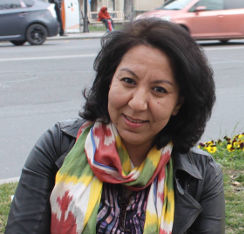Expert’s take: Countries should examine their family legislation to ensure that it protects every type of family
Date:
About the author

Dilbar Turakhanova, is a regular consultant for UN Women from Tajikistan with over 10 years of active experience on promotion of gender equality in Tajikistan and Central Asia. A lawyer by training, Ms. Turakhanova conducted several studies on gender issues for UN Women in Tajikistan, including a review of the family law from the perspective of protection of rights of women and children, and mainstreaming gender into the civil registration legislation and policy framework. Currently, she is supporting UN Women with the development of the Tajikistan Strategic Note for 2019-2022.
The collapse of the Soviet Union and the challenges during the transition period had significant economic and social impacts on families in Central Asia. Civil and political unrest in Tajikistan, economic hardship and an upsurge of traditional values in all Central Asian countries triggered early and unregistered marriages, polygamy and bride-kidnapping. Some justified these practices, claiming they preserved girls’ security during civil unrest, lightened a family’s economic burden or prevented high wedding costs.
Domestic violence remains a serious family challenge across Central Asia. Although Governments have taken measures to prevent domestic violence by adopting laws or introducing support services, few Central Asian governments have developed comprehensive nationwide communication strategies to change gender stereotypes about women and men’s roles and build a culture of zero tolerance towards violence against women, particularly domestic violence.
The rise in unregistered, de facto family unions legitimised by religious ceremony is another challenge across the region. Young women are particularly vulnerable in these marriages, which are not recognized by law and do not protect women in case of divorce or abandonment.
The impact of migration on families in Central Asia
Kyrgyzstan, Tajikistan and Uzbekistan are countries of origin for labour migrants. Men are the majority of the migrants, except in Kyrgyzstan where nearly as many women migrate as men. The Russian Federation and Kazakhstan are the main destination countries.
We need more research to understand the impact of labour migration on families. Projects implemented to address labour migration and its consequences confirmed that labour migration may have both positive and negative impact on families.
On the positive side, labour migration improves economic situation of families and children. Migrant worker families have more financial resources. Studies suggest that migrant worker families use remittances from abroad to prioritize education and health spending for their children.
On the negative side, researchers note family disintegration and a fraying of social ties among family members, especially between the migrant parent and children. Families abandoned by migrant workers face difficult economic circumstances. Male migrants often set up new families in their destination country and leave their origin country family with no financial support. In Tajikistan, for example, there is little protection for children if a marriage is dissolved. In fact, there is no way to claim alimony even if it’s a court imposed legal obligation.
Family policies to promote gender equality and peaceful and inclusive societies in Central Asia
Most Central Asian government policies and national strategies focus on preserving traditional family values and supporting family resilience. Family codes are not relevant for today’s family relations and marriage patterns. They may make both parents equally responsible for their children’s well-being and ensure equal rights to common property of spouses in case of dissolution of registered marriage. But if a de-facto marriage dissolves, they are not effective to protect women in unregistered and polygamous marriages.
Each Central Asian country should carefully study and analyse family and marriage patterns to better understand what families are going through and the factors such as migration that impact their economic and social well-being. Countries should examine their family legislation to ensure that it protects every type of family. Governments should launch nationwide comprehensive information, education and communication strategies to fight gender stereotypes about female and male roles, promote gender equality and build a culture of zero tolerance for violence against women and girls. Systems to effectively monitor early marriages should be strengthened. Empowering girls by ensuring their equal access to all education levels should be implemented across the region.
Effective civil registration system is critical for ensuring legal identity of a person and securing rights. The Government should implement inclusive, gender-sensitive reforms of civil registration systems so that all children and marriages are registered.